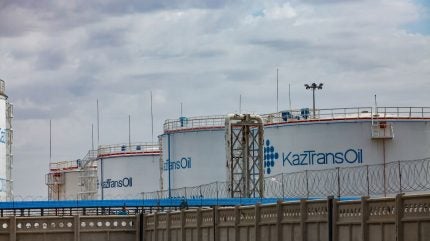
Kazakhstan’s Energy Ministry has announced that it will, by the end of September 2025, make allowances for surpassing its OPEC+ oil production limit in the first half of this year, demonstrating a comprehensive plan for gradual compensation aimed at placating other members of the group.
Kazakhstan, a key player among the eight OPEC+ nations, has agreed to implement additional voluntary production decreases, although specific output amounts were not disclosed on Monday.
“Kazakhstan will make every effort to comply with its obligations and compensate for overproduction in accordance with the intended compensation plan,” the Energy Ministry said, as per Reuters.
According to the news agency, Kazakhstan increased its daily oil and gas condensate production by 4% in June compared with May, reaching 7.24 million tonnes, which surpassed the OPEC+ production quota.
GlobalData upstream analyst Paul Hasselbrinck said: “As production becomes more fragmented, the burden on OPEC+ to restrain production to keep prices up will become increasingly futile.” GlobalData is Offshore Technology’s parent company.
He added: “The risk of producers failing to anticipate or coordinate to prevent oversupply is real, so an oversupply scenario should not be completely disregarded.”
How well do you really know your competitors?
Access the most comprehensive Company Profiles on the market, powered by GlobalData. Save hours of research. Gain competitive edge.

Thank you!
Your download email will arrive shortly
Not ready to buy yet? Download a free sample
We are confident about the unique quality of our Company Profiles. However, we want you to make the most beneficial decision for your business, so we offer a free sample that you can download by submitting the below form
By GlobalDataIn the previous month, OPEC+ announced a gradual phasing out of production cuts over a one-year period from October 2024 to September 2025.
Offshore Technology reported that OPEC’s oil production has remained steady for the third consecutive month, with only a few members surpassing their agreed-upon limits.
“A low-price scenario would be less detrimental for OPEC+ countries, potentially allowing them to regain market share and eventually stabilise prices again,” Hasselbrinck added.
The organisation produced an average of just under 27 million barrels per day in June, about 80,000 barrels a day less than the previous month.
Despite this, analysis revealed that Iraq and the United Arab Emirates have yet to fully implement the previously agreed-upon production cuts within the group.
OPEC secretary-general Haitham Al Ghais mentioned on 27 May that the global economy demonstrated economic strength and expressed confidence in the continued positive outlook for oil demand worldwide.
According to OPEC’s Monthly Oil Market Report for May, the predicted global economic growth rates for 2024 and 2025 are expected to remain constant at 2.8% and 2.9%, respectively.
According to Hasselbrinck: “The primary concern 20 years ago was supply limitations rather than demand. This is why forecasts are updated annually, as unexpected events and trends such as Covid-19, the Russian invasion of Ukraine or the rise of environmental, social and governance factors can significantly impact projections.”



